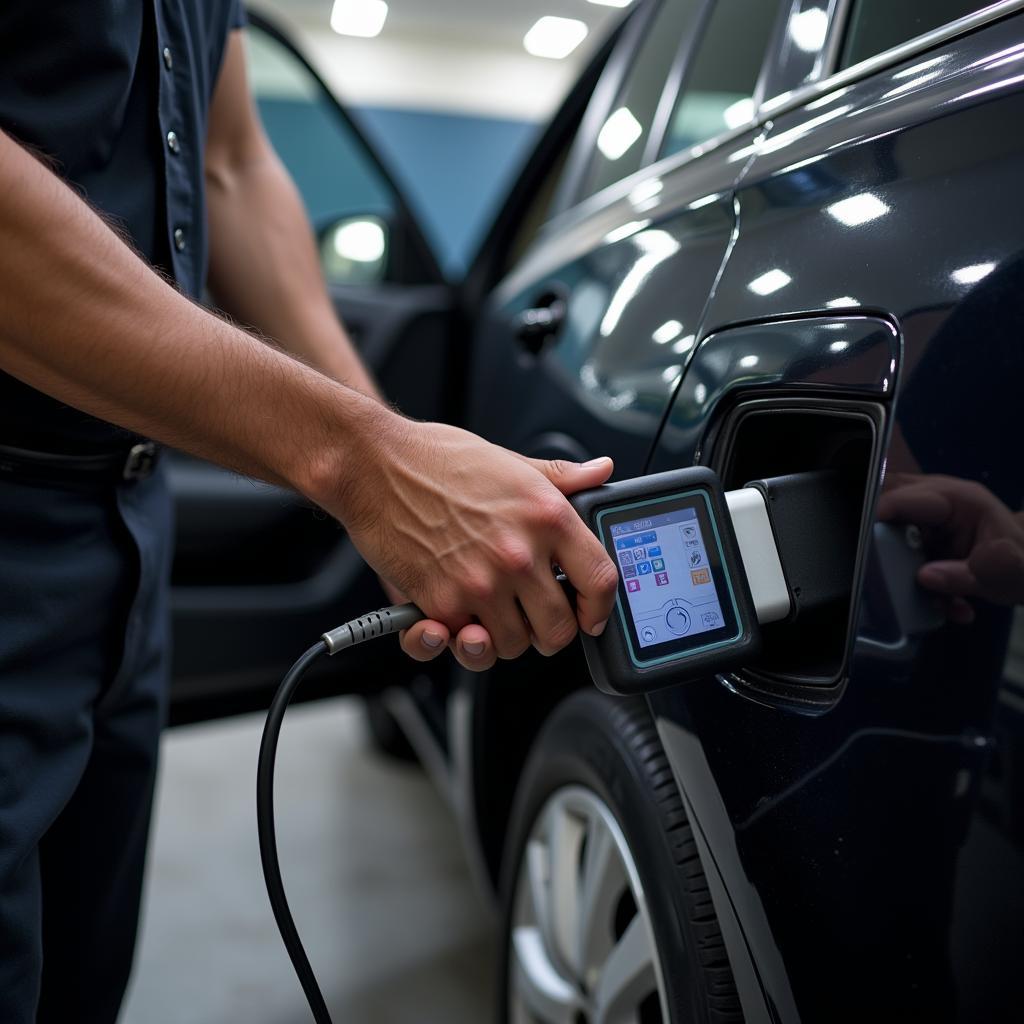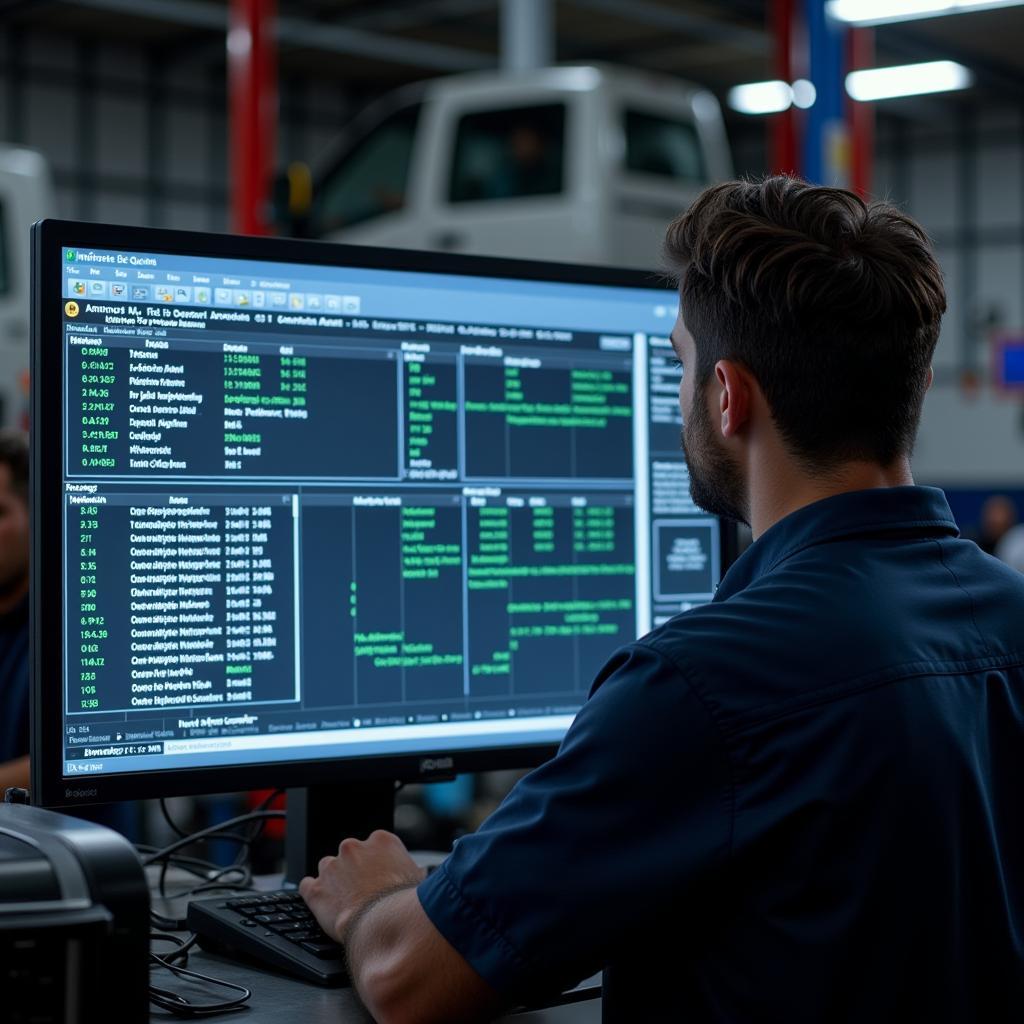When that dreaded “check engine” light pops up on your dashboard, the first thought might be, “How much is this going to cost me?” Understanding diagnostic charges is crucial in navigating the world of car repair and ensuring you’re not overpaying for a simple fix.
What Exactly are Diagnostic Charges?
Before a mechanic can tell you what’s wrong with your car and how much it’ll cost to repair, they need to perform a diagnosis. This process involves using specialized equipment and software to pinpoint the root cause of the issue triggering your car’s warning lights or unusual behavior. Diagnostic charges are simply the fees associated with this crucial step.
 Car Diagnostic Equipment in Use
Car Diagnostic Equipment in Use
Factors Influencing Car Diagnostic Costs
Several factors can influence how much you’ll pay for car diagnostics:
- Type of Diagnostic Scan: A basic scan using a code reader might cost less than a comprehensive scan with advanced software and equipment.
- Make and Model of Your Car: Luxury or rare car models often require specialized diagnostic tools and expertise, potentially leading to higher charges.
- Location: Urban areas with higher operating costs might have higher diagnostic fees compared to rural locations.
- Shop’s Labor Rates: Different repair shops have different hourly labor rates, which can impact the overall diagnostic cost.
Are Diagnostic Charges a Rip-Off?
car diagnostic charge are often misunderstood, leading some car owners to believe they’re being overcharged. However, it’s important to remember that you’re not just paying for the few minutes it takes to plug in a scanner. You are paying for:
- Investment in Technology: Repair shops invest heavily in sophisticated diagnostic equipment and software, and these costs are factored into their charges.
- Technician Expertise: Properly interpreting diagnostic results requires skilled technicians with extensive knowledge of various car systems.
- Time and Labor: Thorough diagnostics involve visual inspections, code analysis, and sometimes test drives, all of which take time and expertise.
 Mechanic Analyzing Diagnostic Report
Mechanic Analyzing Diagnostic Report
How to Avoid Unnecessary Diagnostic Costs
- Check for Recalls: Some car issues are related to manufacturer recalls, which are often addressed free of charge.
- DIY Troubleshooting: For minor issues, try basic troubleshooting steps yourself, such as checking your gas cap or battery connections.
- Maintain Your Car: Regular maintenance can prevent many issues from arising in the first place, reducing the need for frequent diagnostics.
Questions to Ask About Diagnostic Charges
- What type of diagnostic scan is being performed?
- Is the diagnostic fee waived if I get the repair done at your shop?
- Can you provide a detailed explanation of the diagnostic results?
Understanding diagnostic charges empowers you to make informed decisions about your car repair. Don’t hesitate to ask questions, shop around for reputable mechanics, and remember that a thorough diagnosis can save you time, money, and headaches in the long run.
FAQs About Diagnostic Charges in Car Repair
1. How much do car diagnostic tests usually cost?
The price range for car diagnostic tests can vary widely, typically from $50 to $200 or more.
2. Are car diagnostic charges negotiable?
While some shops might be willing to negotiate, it’s important to respect their expertise and the value of the service.
3. Can I perform a car diagnostic myself?
Basic code readers are available for DIYers, but they may not provide the same level of detail as professional equipment.
4. What is included in a car diagnostic test?
A comprehensive diagnostic test goes beyond just reading error codes and may include visual inspections, system checks, and road tests.
rip-off f charge for car diagnostic
5. Why is a car diagnostic important?
Accurate diagnosis is the foundation of effective car repair, preventing unnecessary repairs and ensuring the right problem is addressed.
Common Car Diagnostic Scenarios
- Check Engine Light is On: This is the most common reason for a car diagnostic, and the underlying cause could range from a loose gas cap to a serious engine problem.
- Car Won’t Start: A diagnostic can help pinpoint if the issue lies with the battery, starter, fuel system, or another component.
- Transmission Problems: Slipping gears or rough shifting can indicate transmission trouble, and a diagnostic can help determine the severity.
Looking for more information on car diagnostics and repair costs? Check out our articles on average price for car diagnostic and car diagnostic near me price.
Don’t let car troubles leave you stranded. Contact us today for expert car diagnostic services. Our team is available 24/7 to answer your questions and provide reliable assistance.

Leave a Reply